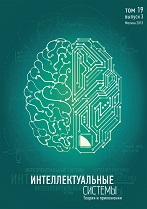|
|
Intelligent systems. Theory and applications, 2022, Volume 26, Issue 1, Pages 164–169
(Mi ista349)
|
 |
|
 |
This article is cited in 1 scientific paper (total in 1 paper)
Part 3: Big Data Mining
Measurement of alcohol well-being in regions based on statistical information
A. P. Ryjova, B. E. Gornyib, A. V. Zudina
a Lomonosov Moscow State University, Faculty of Mechanics and Mathematics
b National Medical Research Center for Therapy and Preventive Medicine of the Ministry of Health of the Russian Federation
Abstract:
To reduce the risks associated with alcohol abuse, it is extremely important to assess alcohol consumption levels. At the same time, it is not enough to know indicators that assess only the volume of retail sales, which does not take into account unrecorded alcohol consumption. The development of an integral indicator of the index, based on available statistical data, will make it possible to level the risks of expert assessment and increase the efficiency of spending budget funds in the field of healthcare. The report provides a description of the available expert and factual information, the structure of the index, an approach to its assessment by means of the theory of fuzzy sets is proposed. The features of the implementation of the index calculation in the Matlab environment are considered, examples are given. The related direct and inverse problems are formulated and discussed, the solution of which will optimize the efficiency of the healthcare system in this parameter at the regional and federal levels. The alcohol well-being index is one of the important parameters of the health care system, on the one hand, and a typical index of socio-economic processes, on the other, therefore, the approaches described in the report can be applied to construct a wide set of such indices.
Keywords:
preventive medicine, alcohol well-being, process evaluation and monitoring.
Citation:
A. P. Ryjov, B. E. Gornyi, A. V. Zudin, “Measurement of alcohol well-being in regions based on statistical information”, Intelligent systems. Theory and applications, 26:1 (2022), 164–169
Linking options:
https://www.mathnet.ru/eng/ista349 https://www.mathnet.ru/eng/ista/v26/i1/p164
|

| Statistics & downloads: |
| Abstract page: | 42 | | Full-text PDF : | 12 | | References: | 14 |
|




 Contact us:
Contact us: Terms of Use
Terms of Use
 Registration to the website
Registration to the website Logotypes
Logotypes








 Citation in format
Citation in format 
